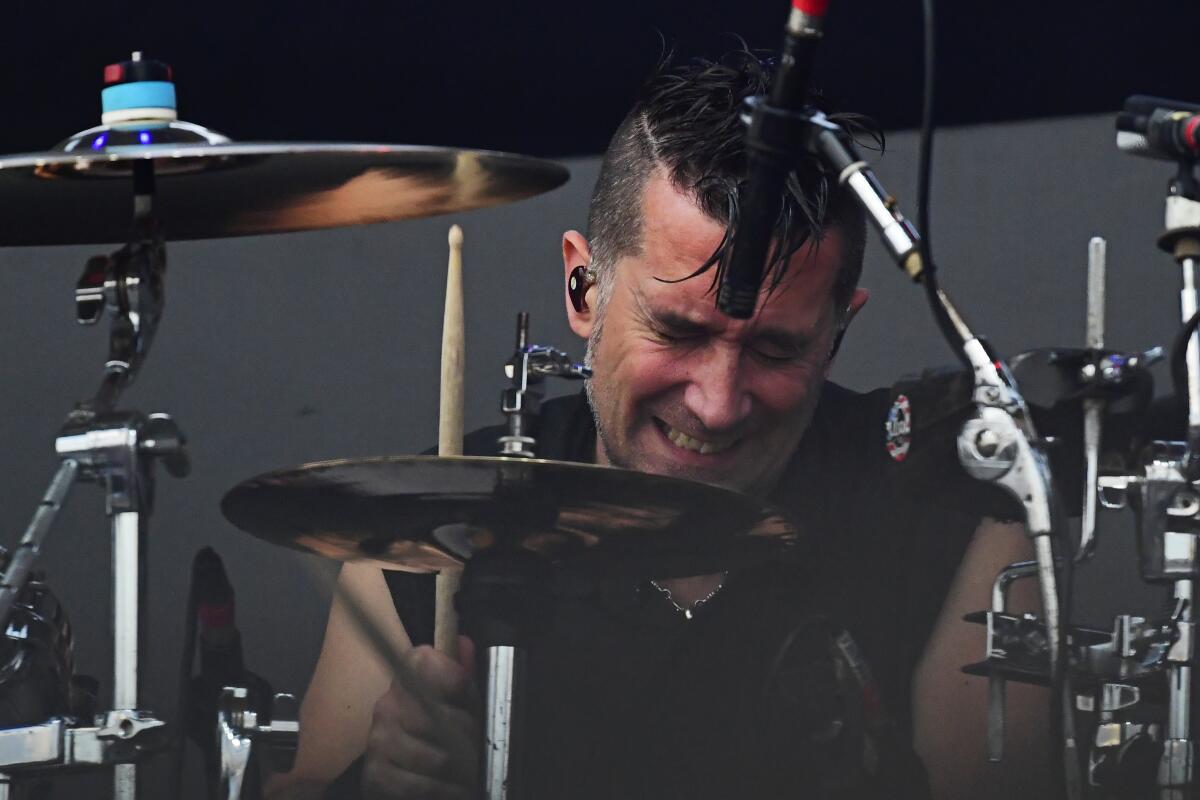Offspring drummer Pete Parada says band cut him loose over COVID-19 vaccine decision

- Share via
Pete Parada, longtime drummer for the Offspring, has gone public with his decision not to get the COVID-19 vaccine, saying he wants to share his story “so that anyone else experiencing the agony and isolation of getting left behind right now — knows they’re not entirely alone.”
His story also has consequences: Parada says he’s been booted from the California-bred band he joined 14 years ago.
“Given my personal medical history and the side-effect profile of these jabs, my doctor has advised me not to get a shot at this time,” the 48-year-old posted Monday on Instagram.
“I caught the virus over a year ago, it was mild for me — so I am confident I’d be able to handle it again, but I’m not so confident I’d survive another post-vaccination round of Guillain-Barré Syndrome, which dates back to my childhood and has evolved to be progressively worse over my lifetime.
“Unfortunately for me (and my family — who is hoping to keep me around a bit longer) the risks far outweigh the benefits,” he continued.
Parada said he has no ill feelings toward the rest of the Offspring. A representative for the band did not immediately reply Wednesday to a request for comment.
“Since I am unable to comply with what is increasingly becoming an industry mandate,” he wrote, “it has recently been decided that I am unsafe to be around, in the studio, and on tour.”
Parada is not an original member of the Offspring — which was formed in 1984 in Garden Grove and is known for hits including “Come Out and Play” and “Why Don’t You Get a Job” — but has been its drummer since 2007.
The 2022 Sundance Film Festival will include both in-person and online screenings. Attendees in Park City, Utah, will need to be fully vaccinated.
The Offspring has a sold-out show set for Sunday at SoFi Stadium as part of the Los Angeles Chargers FanFest, followed by a U.S. and European tour. Fans attending the SoFi gig must attest to being completely vaccinated.
Parada said he “unequivocally” supports informed consent “unburdened by coercion” and finds it unethical and unwise to allow powerful organizations — including the government, corporations and other employers — to dictate medical procedures to those with less power.
“It looks like half the population is having a shockingly different reaction to these jabs than was expected — it’s probably because their life experiences have been shockingly different, and their reasons range from a conscientious risk/benefit analysis, to the financial inability to take time of[f] work/lack of health care in the even[t] of potential side-effects, to an understandable distrust in a system that has never prioritized the health or well-being of their communities,” Parada wrote.
‘Days Go By,’ and for the Offspring it’s been a pretty good time
Last month, based on what it said was the available evidence, the U.S. Food and Drug Administration added a new warning about the Johnson & Johnson (Janssen) vaccine, noting the existence of “an association between the Janssen vaccine and increased risk” of Guillain-Barré syndrome, albeit one “insufficient to establish a causal relationship.”
No similar association has been identified at this point with the Moderna and Pfizer-BioNTech COVID-19 vaccines, the FDA said.
Guillain-Barré syndrome is an immune system disorder that can cause muscle weakness and occasionally paralysis. The FDA said it had received reports of 100 people developing postvaccination GBS out of the 13 million who had received the J&J vaccine at that point.
Eric Clapton, one of rock’s most vocal COVID-19 skeptics, says he reserves to right to cancel any show where vaccination becomes a condition of attendance.
Most cases were reported in men, many of them older than 50. Each year in the U.S., 3,000 to 6,000 people develop the disorder; most fully recover, though some can have permanent nerve damage, according to the Centers for Disease Control and Prevention.
“I hope we can learn to make room for all the perspectives and fears that are happening currently,” Parada wrote. “Let’s avoid the unfortunate tendency to dominate, dehumanize and shout down at each other.
“The hesitant population is not a monolithic group. All voices deserve to be heard.”
More to Read
The biggest entertainment stories
Get our big stories about Hollywood, film, television, music, arts, culture and more right in your inbox as soon as they publish.
You may occasionally receive promotional content from the Los Angeles Times.













